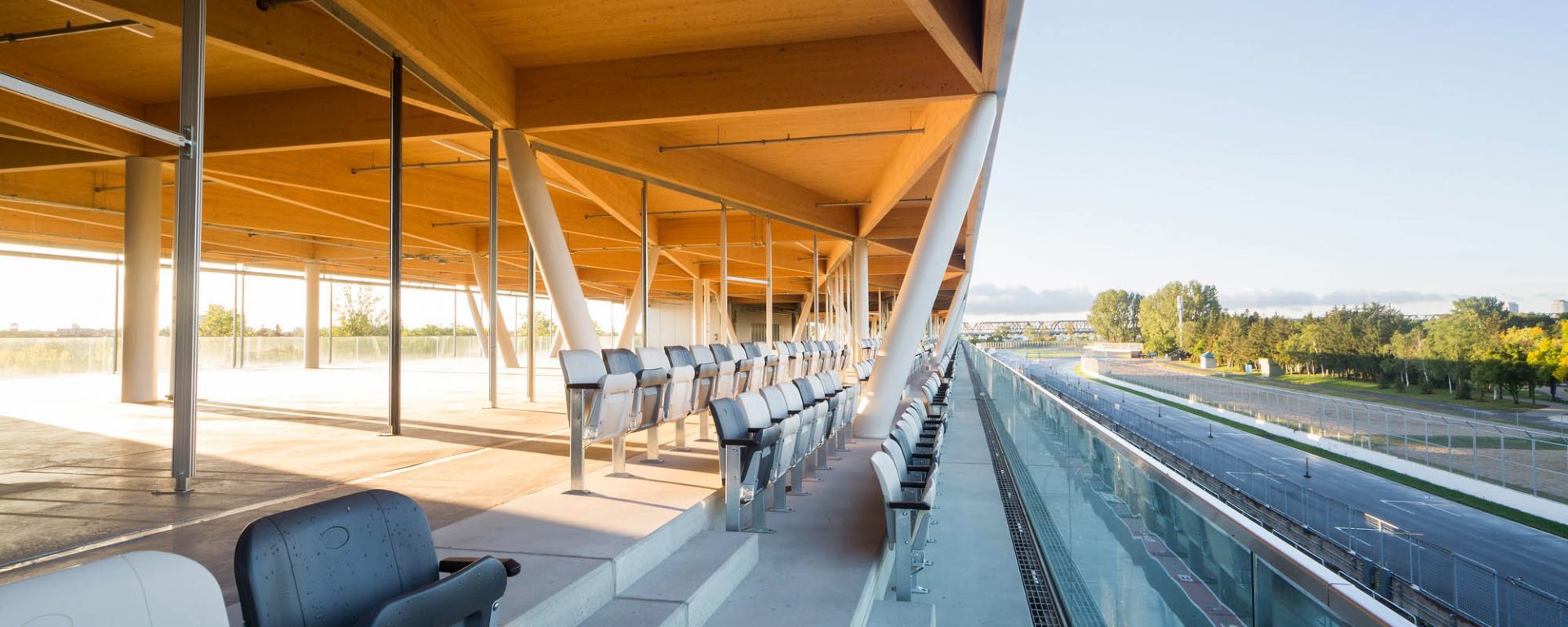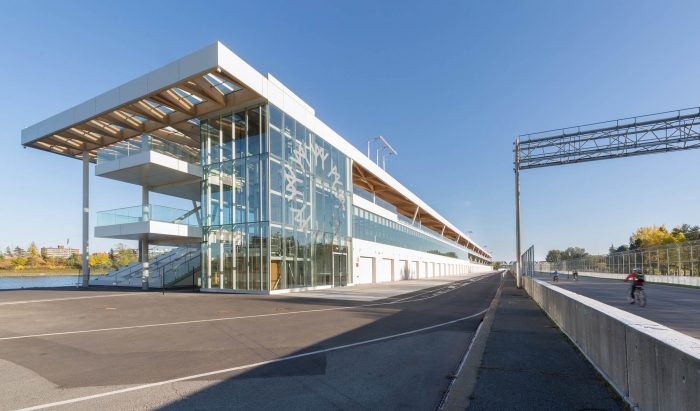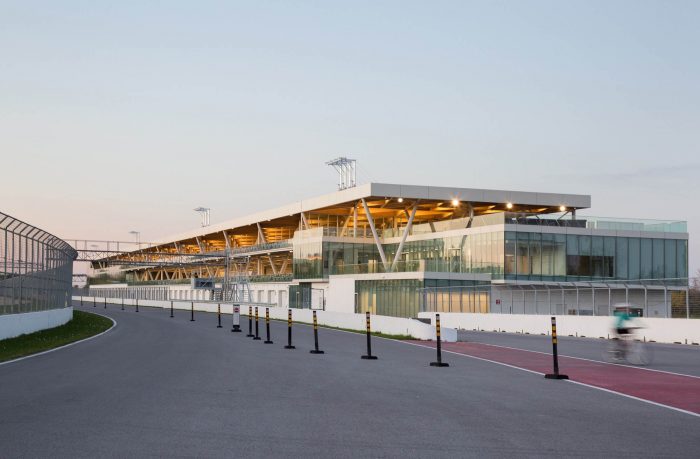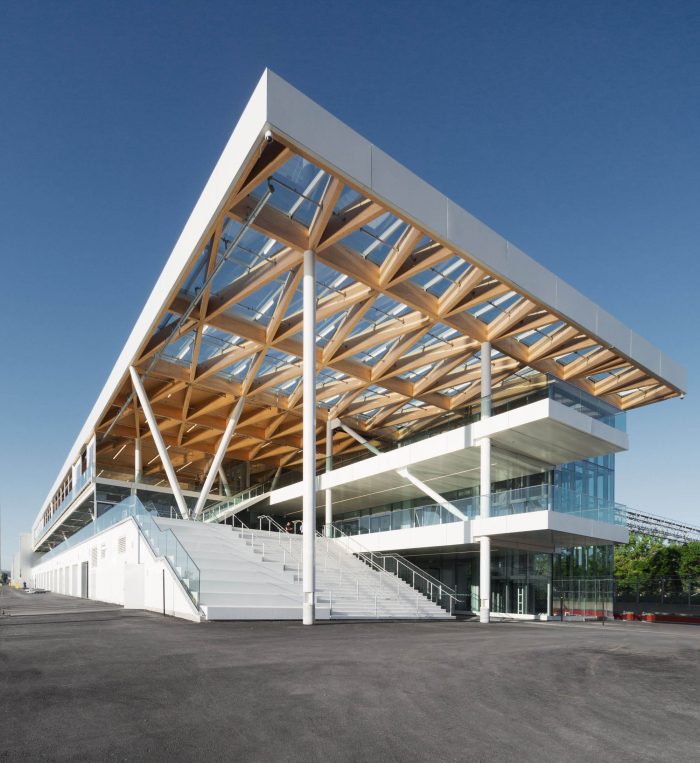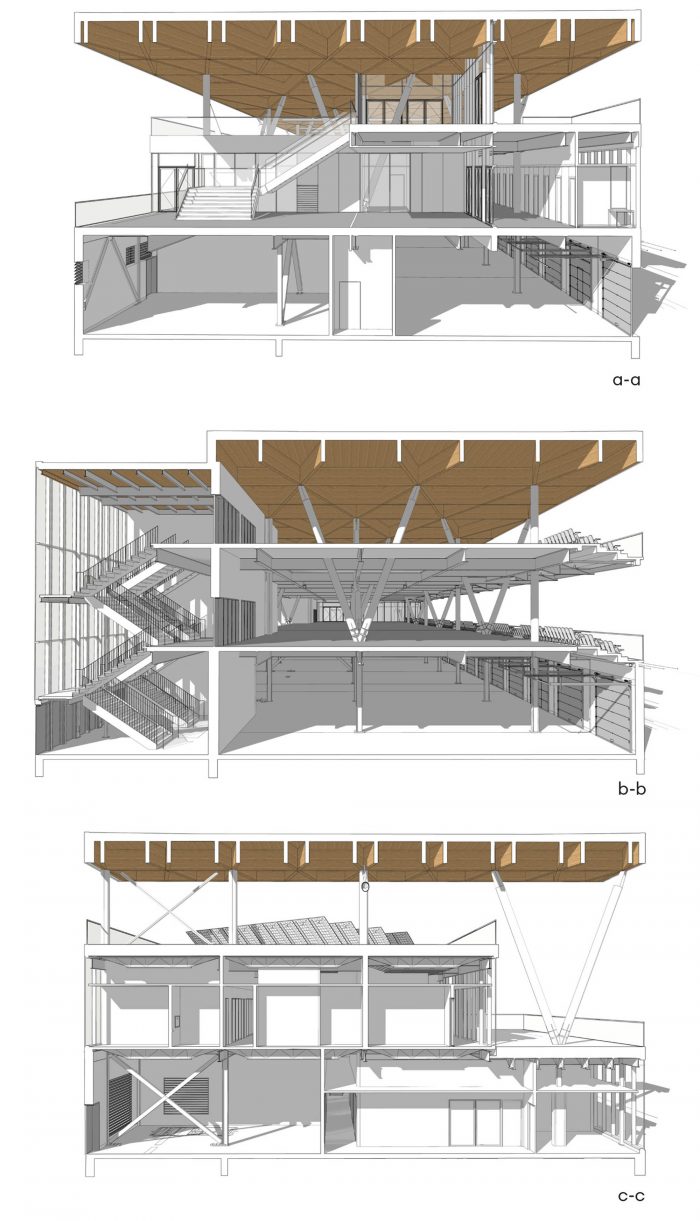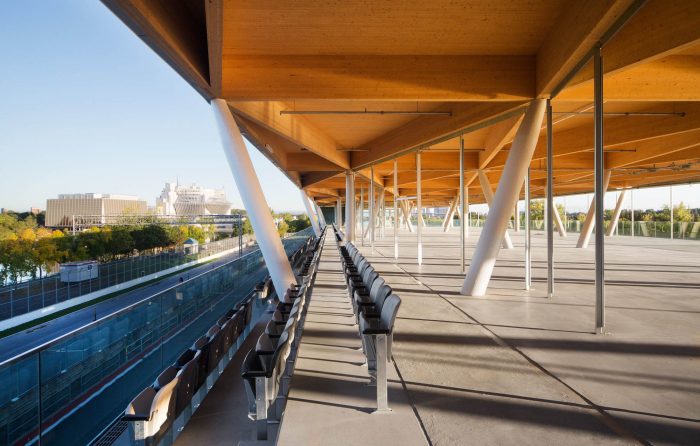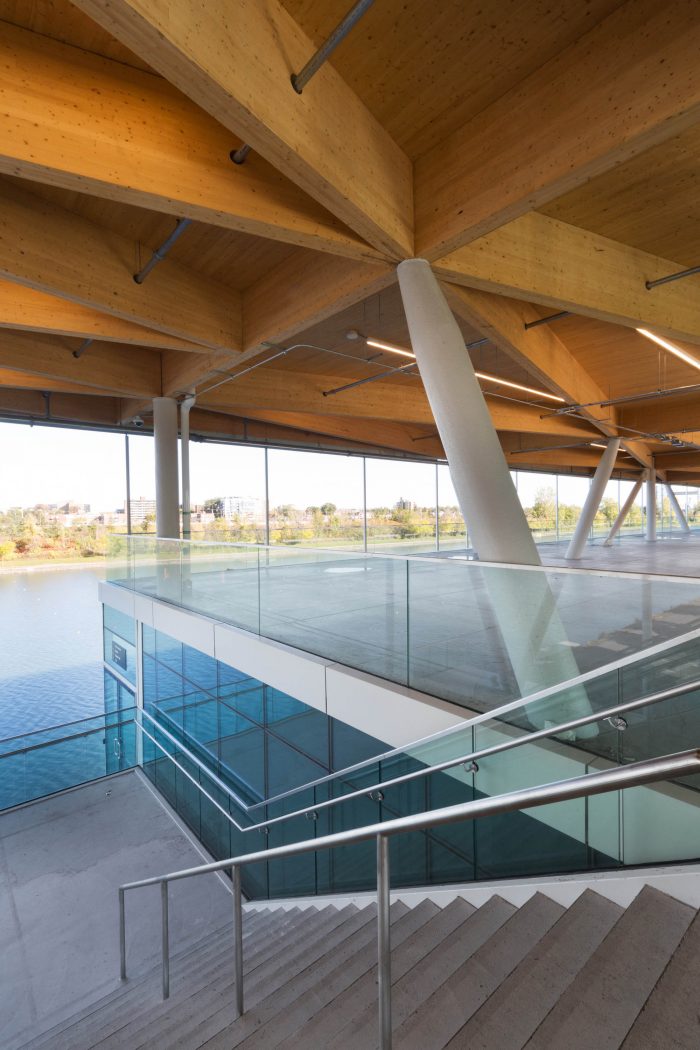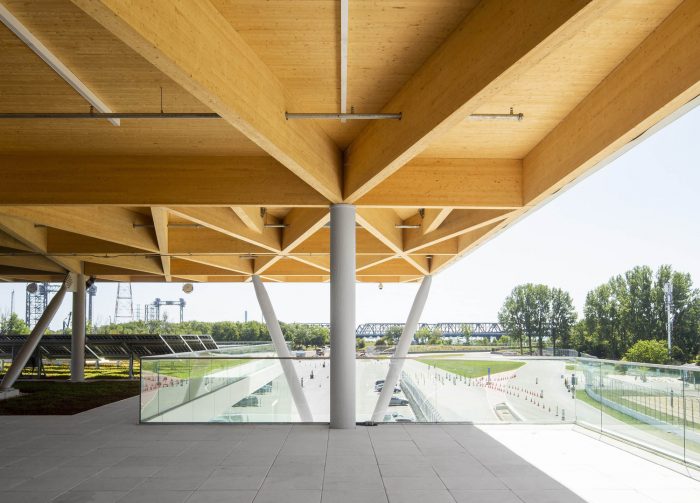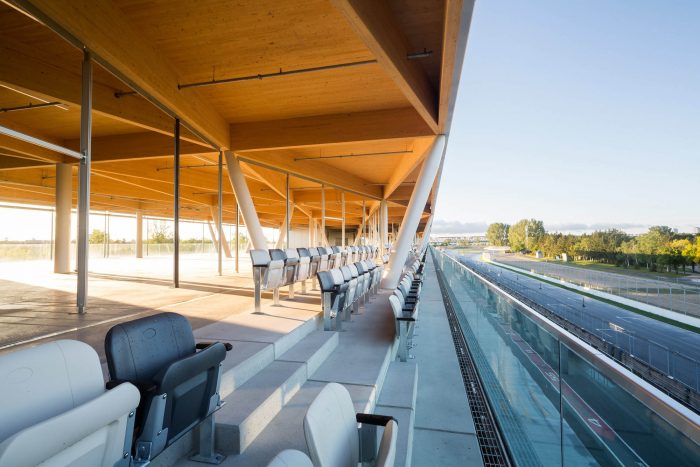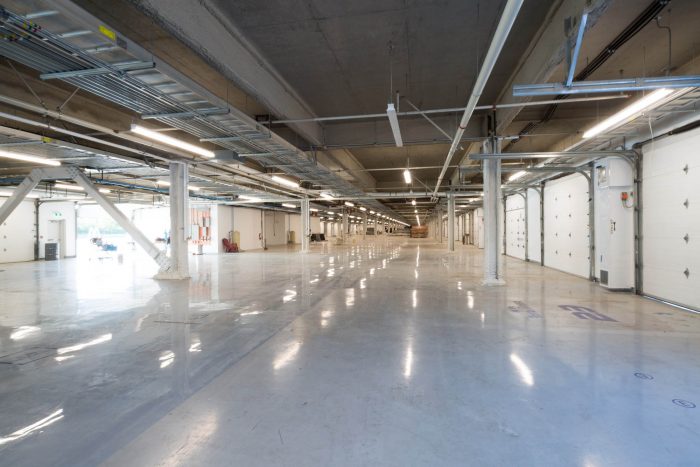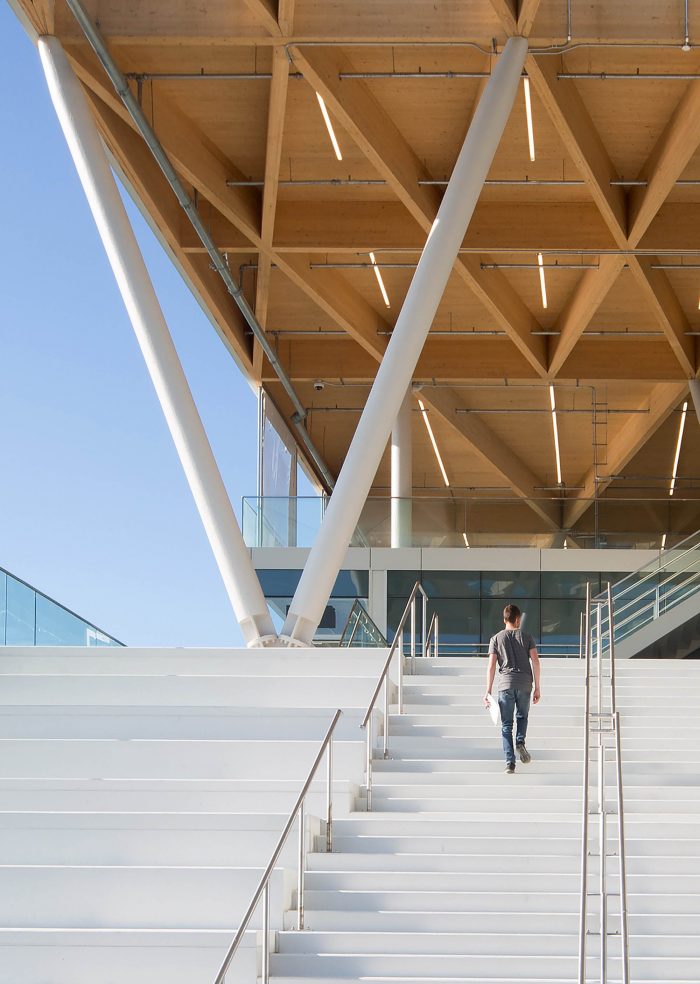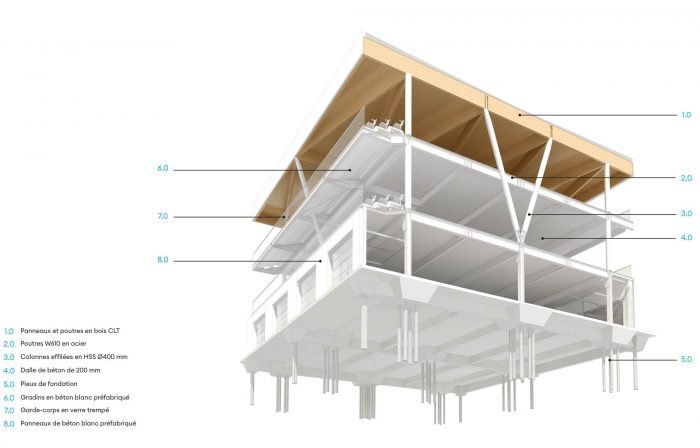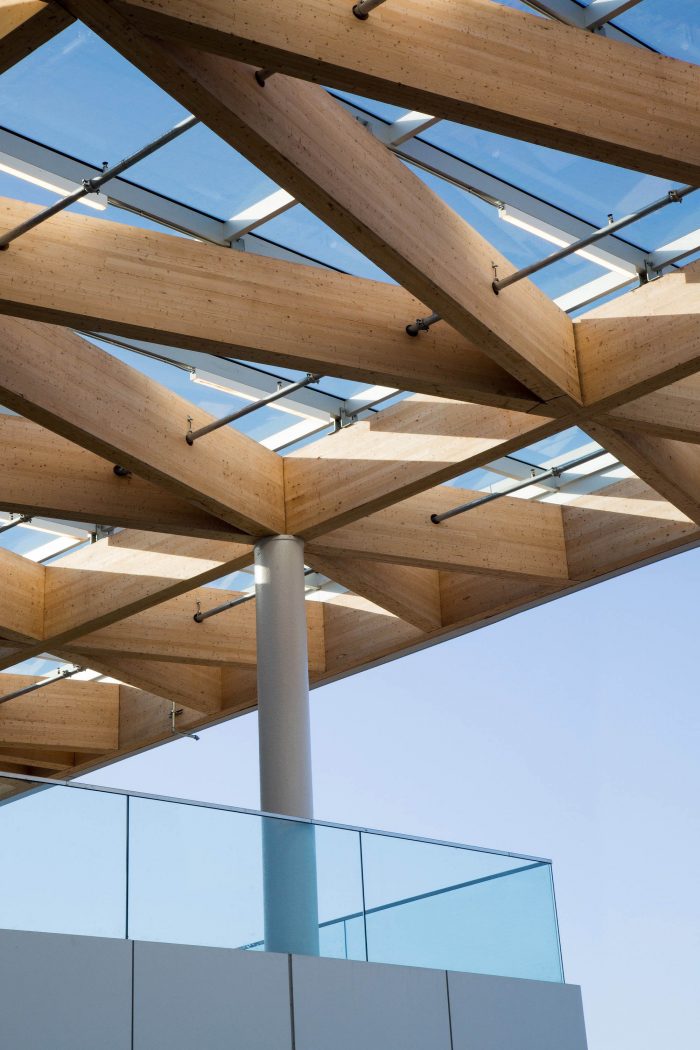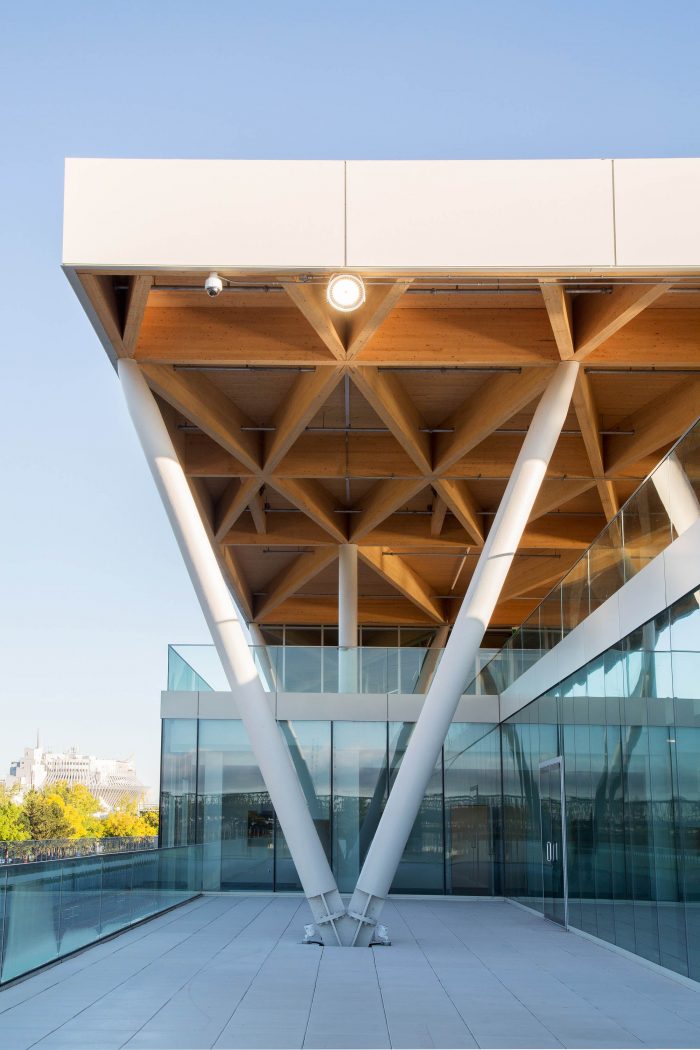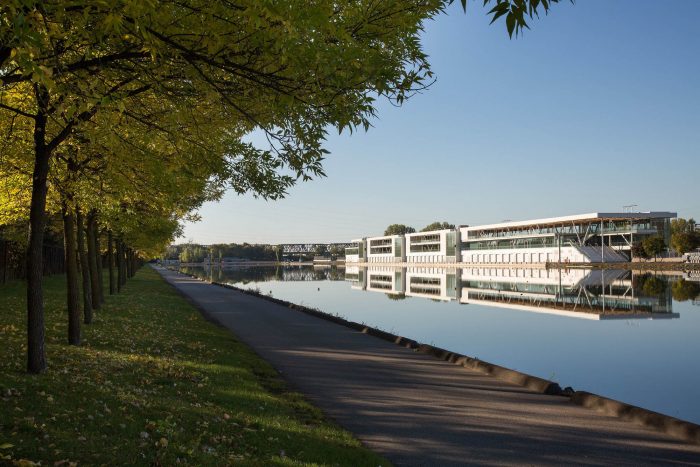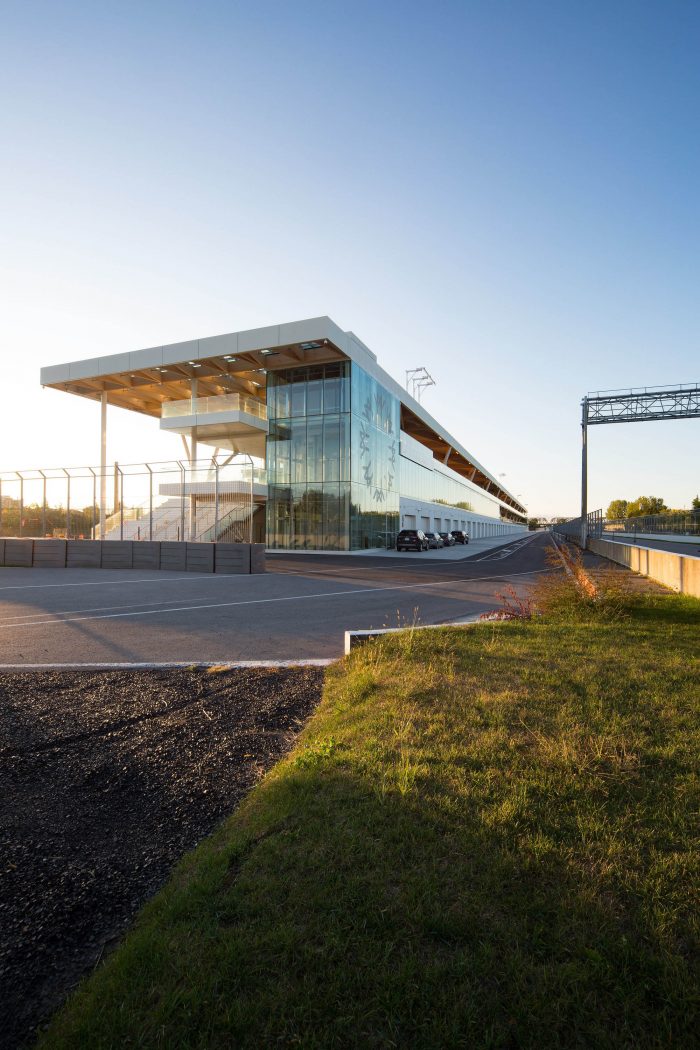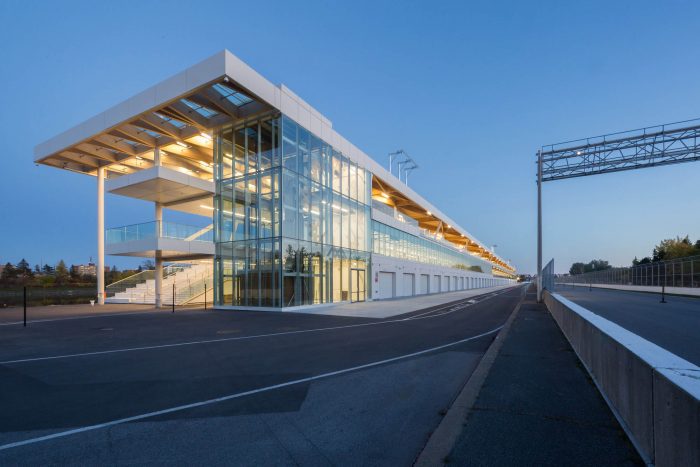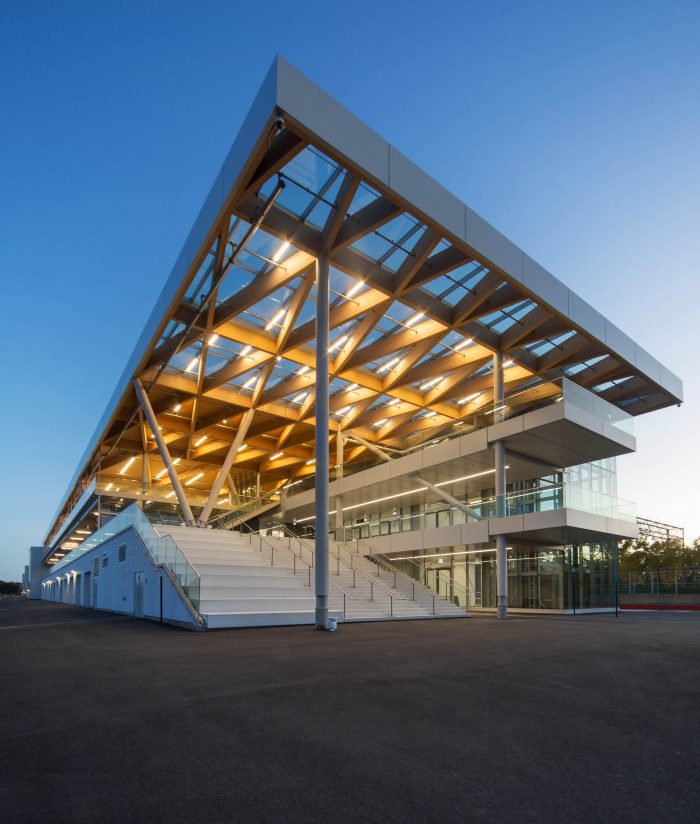作为一级方程式加拿大大奖赛续约协议的一部分,蒙特利尔市必须用更大的永久性建筑取代现有的临时建筑,以便更充分地满足赛事的需要。新的围场包括车队的车库、国际汽车联合会(FIA)和推广方的办公室、可容纳5000人的休息区,以及供记者和广播员使用的多媒体中心。所有的家具和设备都是从国外运来的,并在赛事期间进行安装。
As part of a renewal agreement for the Formula 1 Canadian Grand Prix, the city of Montreal had to replace the existing temporary structures with a larger permanent building that would more adequately meet the needs of the event. The new paddock includes garages for the teams, offices for the International Automobile Federation (FIA) and the promoter, a lounge area for 5,000 people, and a Multimedia Center for journalists and broadcasters. All furniture and equipment are shipped from abroad and installed for the duration of the event.
为了便于在两届大奖赛之间的10个月内完成这个耗资5000万美元的项目,该建筑被设计成一个由预制件组成的组合体,包括混凝土板、钢梁和柱子、CLT木梁和板子、幕墙和可移动隔板。在大奖赛终止的情况下,它还可以方便地拆卸和回收材料。
To facilitate the completion of the$ 50 million project in the 10 free months between the two Grand Prix editions, the building was designed as an assembly of prefabricated parts including concrete panels, steel beams and columns, CLT wooden beams and panels, curtain walls, and removable partitions. It can also be easily disassembled and recycled materials in case of Grand Prix termination.
与其他国际大奖赛不同的是,休息区没有外墙,也没有空调,内部空间的装修也是最低限度的,建筑必须负责任地使用投入的公共资金,同时为蒙特利尔这个全世界3亿多人都能看到的赛事配备体现我们身份和价值观的设备。
Unlike other international Grands Prix, the lounge areas have no exterior walls and are not air-conditioned, the interior spaces are minimally finished and the building must make responsible use of the public funds invested while equipping Montreal with equipment that reflects our identity and values for an event seen by more than 300 million people around the world.
概念。该建筑呼应了1967年世界博览会在圣母岛举办时标志着魁北克想象力的创新结构。 地球社的标志用Y代表伸出双手的男人,仍然是这个夏天不可磨灭的象征,标志着这里现代性的到来。屋顶的木质结构以几何学为基础,反映出我们希望摆脱通常与赛车,特别是与一级方程式赛车相关的形象和价值观。新的业主和赛道负责人的出现,使这一提案被接受成为可能,这与他们希望摆脱浮夸的全球化奢华的愿望相一致,以突出赛道每个阶段的文化和地理特征,并使其适应新兴的价值观。
Concept. The building echoes the innovative structures that marked Quebec’s imagination when the 1967 World’s Fair was held on the site of Île Notre-Dame. The Terre des Hommes logo using the Y to represent men with outstretched hands remains an indelible symbol of this summer that marked the advent of modernity here. The wooden structure proposed for the roof is based geometrically on this memory and reflects our desire to move away from the images and values usually associated with motor racing and more specifically with Formula 1. The advent of new owners and executives at the head of the circuit has made possible the acceptance of this proposal, which corresponds to their desire to move away from the ostentatious globalized luxury in order to highlight the cultural and geographical specificity of each stage of the circuit and adapt it to emerging values.
程序。新围场将容纳多达13个马厩,每个马厩都有两个前部通道,供单座赛车、车手和技术团队使用,以及位于建筑后部的服务通道,供设备或快速进入重新开发的接待区。车库空间的设计没有固定的分区,而是根据每届加拿大大奖赛车队的需求进行模块化设计:临时隔断将用于创建所需的分区,从而满足这项不断发展的运动的技术需求。
Program. The new Paddocks will accommodate up to 13 stables, each of which will have two front access for single-seaters, drivers, and technical teams, as well as service access located at the rear of the building for equipment or for quick access to the redeveloped hospitality area. Designed without a permanent division, the garage space is modular according to the needs of the teams at each edition of the Canadian Grand Prix: temporary partitions will be used to create the desired divisions and thus suit the technical needs of this constantly evolving sport.
该建筑为体育评论员以及国际汽联和FOWC的代表提供了一个全新的空间配置:重新设计了分布,以满足利益相关者与赛道上发生的行动互动的需求。与老控制塔不同的是,老控制塔是在高处制作的,以便在赛道上提供良好的可视性,而新的控制塔则是水平排列在建筑的2层,因为现在新的比赛控制技术要求较低的直接可视性。为了给记者代表提供高质量的服务,媒体空间被整合到建筑中,而不是设在临时帐篷中,即模块化的照明、合适的通风系统以及包括光纤在内的电气和电信连接盒。
这个媒体空间也是向蒙特利尔人提供的租赁空间,用于在大奖赛期间以外的四季活动。该建筑的设计不仅使赛道上的景色成倍增加,而且还在二楼和三楼开发了几个露台,使其周围的整个公园环境的景色更加优美。新建筑较高,为观众呈现了一个360度的全景。一边是Jean-Doré海滩、蒙特利尔赌场、67年世博会期间的前法国馆以及与之相邻的前魁北克馆的近景。在远处,可以看到蒙特利尔市、皇家山和它的十字架。另一边,一眼就能看到奥运泳池,划船、独木舟、龙舟等团体在此训练。后面,是货船穿过的圣劳伦斯河的狭窄通道,然后是蒙特利尔的南岸。
The building presents a completely new configuration of the space for sports commentators and representatives of the FIA and FOWC: the distribution has been redesigned to meet the need for stakeholder interactions with the action taking place on the circuit. Unlike the Old control tower which was made at height to offer good visibility on the track, the new tower is arranged horizontally on 2 floors right in the building, as new race control technologies now require less direct visibility. A media space is integrated into the building rather than being located in a temporary marquee, in order to provide quality services to journalistic representatives, namely modular lighting, a suitable ventilation system, and electrical and telecommunications connection boxes including optical fiber.
This media space is also a rental space made available to Montrealers for events outside the Grand Prix period in all seasons. The building has been designed to multiply the views on the race track, but also on the entire environment of the park that surrounds it, with the development of several terraces on the 2nd and 3rd floors. The new building being higher presents a 360-degree panorama to the spectators. On one side, a close-up view of Jean-Doré Beach, the Casino de Montréal, former Pavilion of France during Expo 67, as well as the former Pavilion of Quebec that is adjacent to it. In the distance, the city of Montreal, Mount Royal, and its cross are visible. On the other side, you can see at first glance the Olympic pool where groups of rowing, canoeing, and dragon boats train. Behind, a narrow passage of the St. Lawrence River crossed by freight boats, then the South Shore of Montreal.
普遍的无障碍设施。新建筑的无障碍设施已经完全重新设计:整个地下一层与地面处于同一水平线上,各楼层可通过位于东入口处的全景玻璃电梯进入。此外,还提供了看台和卫生间,以确保无障碍的普遍性和出行的便利性。
Universal accessibility. Accessibility has been completely redesigned in the new building: the entire ground floor is on the same level as the ground and the floors are accessible via a panoramic glass elevator located at the east entrance. Bleachers and bathrooms are also provided to ensure universal accessibility and ease of travel.
可持续发展。1425立方米的屋顶结构由木材制成,这是一种耐用和可再生的材料。由于木材在生长过程中会从大气中捕获二氧化碳,并将其封存在纤维中,因此,这一体积的木材相当于封存了1 000多吨二氧化碳。因此,木材被认为是碳负值,这意味着在建筑中使用木材不仅能产生低碳排放,而且还能帮助清除大气中的额外二氧化碳。
Sustainable development. The structure of the roof of 1425 m3 is made of wood, a durable and renewable material. Since, during its growth, wood captures CO2 from the atmosphere and sequesters it in its fiber, this volume of wood corresponds to the sequestration of more than 1,000 tons of CO2. Wood is thus considered carbon negative, which means that not only does the use of wood in construction generate low carbon emissions, but also helps to remove additional carbon dioxide from the atmosphere.
屋顶的防水层采用了白色矿物颗粒覆盖的弹性涂层,以限制热岛效应和观众的温度上升。露台上的太阳能光伏板总面积为64平方米,一年的太阳能储存量足以弥补大奖赛期间整个建筑所需的能源消耗。安装后的系统每年平均可提供87,600千瓦/小时的能量,而F1赛事期间的预计能耗为88,940千瓦/小时。
The waterproofing of the roof is carried out with an elastomeric coating covered with white mineral granules in order to limit the heat island effect and the temperature rise for the spectators. The solar photovoltaic panels on the terrace total 64 m2 and should store enough solar energy in one year to compensate for the energy expenditure required for the complete building at a Grand Prix. The installed system will provide an average of 87,600 kW/hre per year and the estimated energy consumption during the Formula 1 event is 88,940 kW / hre.
本地生产。用于梁的木材,以胶合和交叉层压(CLT)的形式,以及用于甲板的木材,以交叉层压的形式,来自魁北克北部,价值物种和小块木材,以优化所有树木在切割过程中的纤维。混凝土预制件来自魁北克一家公司,幕墙和钢结构也是如此。将结构分成几个独立的批次(混凝土、钢和木头),使工厂能够同时生产大量的材料,并在非常有限的时间内完成安装,尽管冬天很严寒。
Local Production. The wood used for the beams, in the form of glued and cross-laminated (CLT), as well as for the decking, in the form of cross-laminated, comes from northern Quebec and values species and small pieces of wood to optimize the fiber of all the trees during the cutting. The precast concrete parts come from a Quebec company, as are the curtain walls and the steel structure. The division into several separate batches of the structure (concrete, steel, and wood) allowed simultaneous production in the factory of colossal quantities of material as well as their erection in a very limited period of time and despite a harsh winter.
建筑师:FABG
年份:2020年
摄影:Steve Montpetit
客户:Société du Parc Jean Drapeau
项目总监:Éric Gauthier
项目经理:Marc Paradis, Nicolas Moussa
城市:蒙特利尔
国家:加拿大
Architects: FABG
Year: 2020
Photographs: Steve Montpetit
Client:Société du Parc Jean Drapeau
Project Director:Éric Gauthier
Project Managers:Marc Paradis, Nicolas Moussa
City:Montréal
Country:Canada

